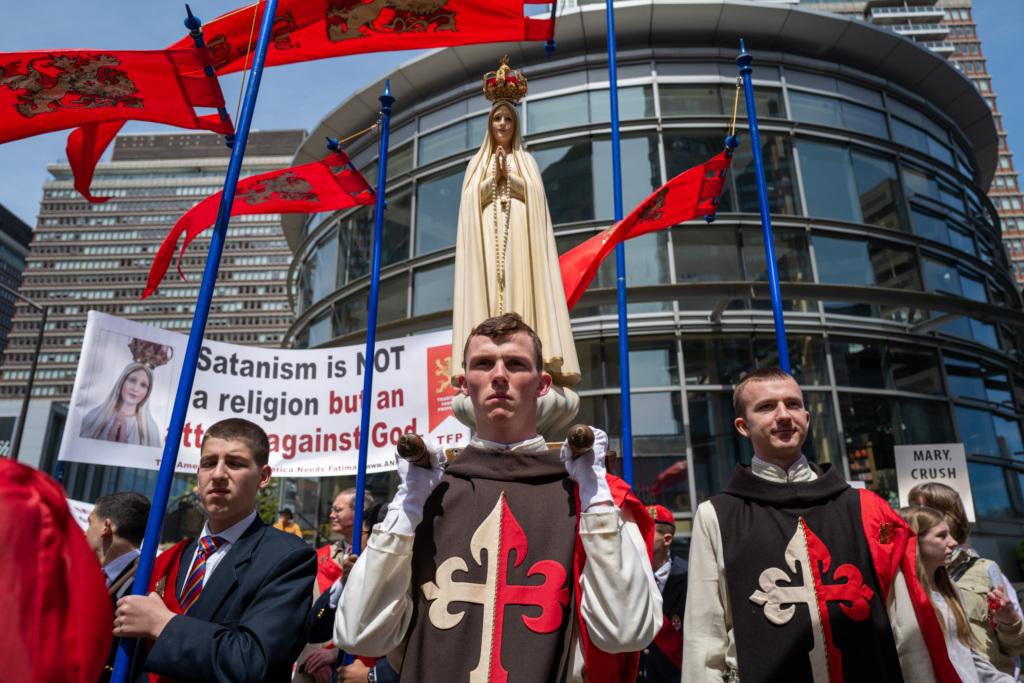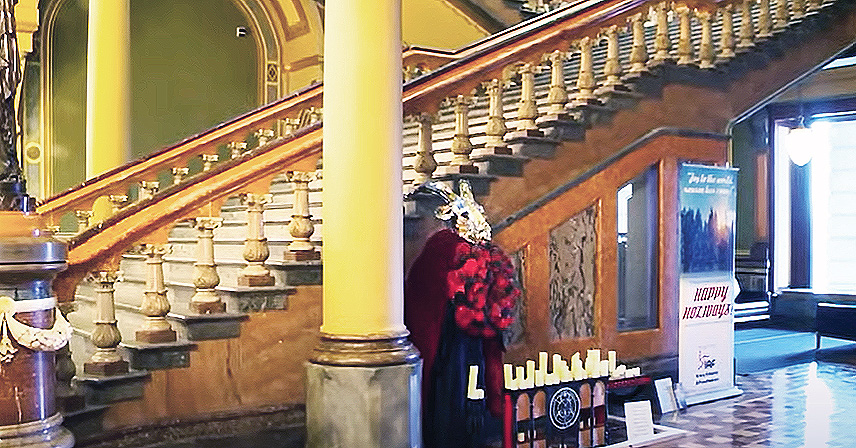
In late January, a group of clearly agitated people gathered outside Chimneyrock Elementary School in Cordova, Tenn., marching, waving signs and chanting.
What brought them out that day? The protesters were upset over the presence of a school club they dislike — or, more accurately, they don’t understand.
The target of the protesters’ wrath was the Satanic Temple, which had just launched an After School Satan Club (ASSC) at Chimneyrock.
The irony is, the protesters are responsible — indirectly, at least — for the existence of the club. For years, Chimneyrock Elementary has allowed a Good News Club, an evangelical Christian group known for its aggressive forms of proselytism aimed at children, to meet on school grounds. Presumably, many residents of Cordova wanted the Good News Club in the school. And after school officials approved its presence, they had to extend the same right to other religious groups — and, as Americans United pointed out, that includes the Satanic Temple.
Despite its provocative name, the Temple, which was designated a tax-exempt church by the Internal Revenue Service in 2019, does not worship Satan, or even believe in such a being. Rather, it views Satan as a metaphorical figure and a representation of resistance to blind authority. Its after-school club emphasizes science and reason.

Hatin’ on Satan: Protestors in Boston assail the Satanic Temple (Spencer Platt/Getty Images)
Temple members are kind of deliberate provocateurs, aggressively pushing to restore the boundaries of church-state separation. Their argument is that any privilege or right extended to majority religious groups must be given to minority ones as well, even if they’re unpopular.
As a matter of law, the argument is solid. The U.S. Supreme Court is increasingly embracing a theory of “religious freedom” (more like religious weaponization) that allows harms and discrimination against others, but it hasn’t abandoned the policy of equal treatment of religions just yet. Benefits given to one group must be available to all.
The Tennessee protesters seemed to have a difficult time grasping this. The organizer of the protest, Charlotte Bergmann, told a Memphis TV station, “What I want [the] school district to do is to obey the law —and allow God to take care of this because this fight is not between the school and the satanic club. This fight is between God and the satanic club, and God’s going to bring it down.”
As AU noted, the district is obeying the law. School officials allowed a Good News Club to operate, and now they can’t legally deny that same right of access to a religious group that seeks to form a similar club.
Some school officials joined the crusade against the club.
“Satan has no room in this district,” said Althea E. Greene, board chair of the Memphis-Shelby County Schools. “We can uphold freedom of speech while uplifting our students and families.”
A similar case played out recently in Peoria, Ill. An After School Satan Club had been meeting in Jane Addams Elementary School of the Moline-Coal Valley Community Unit School District No. 40 for two years, but last year the district denied the club permission to continue meeting, even though a Good News Club was allowed to keep on meeting. The district cited alleged threats — all investigated and deemed to be non-credible — as a reason for denying access to the ASSC.
In a letter to the district, AU explained to officials why it was unconstitutional and discriminatory to treat the ASSC differently from the Good News Club.

Baphomet in the hall: Satanic Temple’s display in Iowa statehouse
“Given the multiple different excuses and the disparate treatment of the religious viewpoints at issue, it is clear that the district has engaged in unconstitutional viewpoint discrimination,” AU attorneys wrote to the district. “The district must treat the Satanic Temple equally to the Good News Club and to all other groups that access the Jane Addams Elementary facility pursuant to the district’s facility-use policy. If the district is unwilling to deal with the consequences of unpopular speech in a public forum that it willingly opened, then the district is fully within its rights to close the forum. But it may not discriminate on the basis of viewpoint, as it has done here.”
AU’s intervention was successful, and the club was able to return to the school for a third year.
Failure to obey the law in this area can be costly. Last year, the Saucon Valley School District in eastern Pennsylvania agreed to pay $200,000 in attorneys’ fees and other costs to settle a lawsuit brought against it by the American Civil Liberties Union.
The district allowed a Good News Club to operate in its middle school but denied the Satanic Temple the right to use the property. The district had originally allowed the Temple to start a school club but reversed itself after public protests. A federal court ruled for the Temple, asserting, “When confronted with a challenge to free speech, the government’s first instinct must be to forward expression rather than quash it. Particularly when the content is controversial or inconvenient. Nothing less is consistent with the expressed purpose of American government to secure the core, innate rights of its people.”
The district chose to settle rather than pursue litigation it stood virtually no chance of winning.
Although some Americans may have difficulty understanding this concept, there is no hierarchy of religions in America. Christianity often seems to enjoy more privileges because it is the majority faith, but this is a matter of custom and tradition, not law.
Over the years, minority religions and other groups have used the principle of equal treatment to their benefit, and the Satanic Temple is only the latest manifestation of this. In doing so, they’re operating within a well-established historical precedent. Reflecting on the passage of his Virginia Statute for Religious Freedom, Thomas Jefferson rejoiced that it protected “the Jew and the Gentile, the Christian and Mahometan, the Hindoo and infidel of every denomination.”
But bringing Jefferson’s vision to life has sometimes proved difficult. Too often, conservatives operate on the principle “free speech for me but not for thee.”
Consider the dynamic that played out in 1984 after Congress, at the prodding of several conservative religious groups, passed the Equal Access Act (EAA). The federal law requires public secondary schools to allow students to form religious clubs that meet during non-instructional time when certain conditions are in place.
Christian Nationalist organizations were eager to see EAA become law. For years, they had argued that public schools were “godless,” and, despite repeated efforts, had been unable to pass an amendment to the U.S. Constitution reintroducing school-sponsored programs of mandatory prayer and Bible reading.
The Equal Access Act was seen as a way of getting around the ban on coercive forms of religion in public schools since the clubs would be run by students and participation would be strictly voluntary.
At the time, Americans United warned Christian Nationalist groups that under the act, students would be able to form a range of clubs not related to the school curriculum and some of these clubs might not be to their liking. Religious Right groups insisted they were OK with that, but soon demonstrated that they were not when, in the 1990s, students in some public schools began using the EAA to form Gay-Straight Alliances (now also known as Genders-Sexualities Alliances), clubs designed to foster safe spaces and show support for students who are LGBTQ+.
The right-wingers hit the roof, but the law was firmly on the side of the students. In 1999, a federal court made this clear by ruling that denying students at a Salt Lake City high school the right to form a Gay-Straight Alliance was a violation of the EAA.
Similar battles often erupt over religious displays. Again, the central idea here is equal treatment. If majority religious groups are given access to a public space to display their symbols, all groups must be given that same right. During the December holidays, Christian and Jewish groups often receive the right to use their own money and labor to erect nativity scenes and menorahs in areas deemed public forums, such as lawns in front of or near government buildings or sometimes spaces inside the structures.
But again, controversy often erupts when groups like the Satanic Temple and nontheistic organizations demand the same right of access, which, under the law, they have a right to receive.
Last year, the Satanic Temple was given the right to display a statue of the Pagan idol Baphomet at the Iowa statehouse. The figure, wearing a red robe and a wreath, was depicted standing behind an altar. A sign made it clear that the display was “not owned, maintained or promoted, supported or associated with the State of Iowa,” and the space also housed privately sponsored displays by Christian and Jewish groups.
Despite these disclaimers, several lawmakers, including Gov. Kim Reynolds (R), made it clear that they despised the Temple’s display and were tolerating it only because they had to, and they trashed it in the media. Not surprisingly, a man vandalized the display by ripping the head off the statue and tossing it in a trash bag. The man, Mississippi resident Michael Cassidy, turned himself in to the police and freely admitted what he had done, calling the display “evil.” Conservative groups have raised tens of thousands of dollars for his legal defense.
An Iowa lawmaker, Sen. Sandy Salmon (R-Janesville) subsequently introduced legislation (SF 2210) that states, “Displays, symbols or the practice of Satanic worship shall not be allowed on public property, in the public schools, on property owned by public schools, or on any property owned by the state or its political subdivisions.”
A similar measure is pending in Arizona, where a band of Republican legislators have introduced a bill (SB 1279) titled the “Reject Escalating Satanism by Preserving Essential Core Traditions (RESPECT) Act.” It would revise state law to say, “Satanic memorials, statues, altars or displays or any other method of representing or honoring Satan may not be displayed on public property in this state” — a problematic provision on many levels.
The measure’s lead sponsor, state Sen. Jake Hoffman (R-Queen Creek), is best known for being among a slate of Arizona “fake electors” who challenged President Joe Biden’s victory in the state in 2020.
During a hearing on the bill last month, Hoffman insisted that “Satanism is not a religion. Satan is implicitly antithetical to religion.” He added that Satan is “universally known to be explicitly the enemy of God,” and opined that “literally everyone” agrees with that statement. He badgered and interrupted witnesses who testified against the bill.
The measure passed the Senate Government Committee 5-1, with state Sen. Juan Mendez (D-Tempe) providing the sole dissenting vote.
In Michigan, state Rep. Josh Schriver (R-Oxford) got so upset over a “yule goat” that was displayed by the Satanic Temple of Western Michigan on a lawn near the capitol building that he has proposed stripping “nontheistic” groups of their tax-exempt status — a move of dubious legality, to put it mildly. (The lawns adjacent to the capitol are free-speech zones, and other private groups had been erecting displays there, including a nativity scene and a menorah.)
Interpreted broadly, Schriver’s proposal could have broad implications and target groups such as the Unitarian Universalist Association, Ethical Culture, humanist organizations and some sects of Buddhism that lack belief in a personal god.
“Religious Freedom includes freedom to believe as one will and follow one’s own conscience, as well as the freedom to doubt or disbelieve,” Lucien Greaves, co-founder of the Satanic Temple, told Church & State. “Yet bills like this would punish some Americans for their beliefs by denying them access to the public spaces and benefits that every other religion takes for granted.
“This is an attempt to codify Christian Nationalist supremacy in complete ignorance of the Constitution and in flagrant disregard of democratic principles,” Greaves added. “I won’t say these bills can’t pass in state legislatures, but the only way they could survive legal scrutiny is if our courts were to abandon the law, specifically the very principle of religious freedom itself.”
Jay Wexler, a professor of law at Boston University and author of the 2019 book Our Non-Christian Nation: How Atheists, Satanists, Pagans, and Others are Demanding Their Rightful Place in Public Life, blasted the Iowa and Arizona proposals in an email to Church & State, calling them “the most offensive, sickening, vile laws I think I’ve ever seen proposed in the religion space.”
Added Wexler, “They clearly violate the most fundamental demand of the First Amendment’s religion clauses, which is that the government may not target any particular religion for negative treatment. Satanism in general, and the Satanic Temple specifically, are genuine religious beliefs and communities that deserve to be protected by our legal system, not singled out for harm by it. Those who have proposed and supported these bills believe not in true religious freedom and pluralism but rather the supremacy of one specific version of religion — their own. This is exactly what the Constitution forbids.”
Disputes over equal treatment pre-date the rise of the Satanic Temple. For decades, groups like American Atheists and the Freedom From Religion Foundation (FFRF) have sought equal space for nontheistic displays in public areas, especially in December when private groups bring holiday-themed displays to government property. FFRF provides banners and signs for supporters who want equal time for nonreligous messages. Among its offerings is a “nativity scene” depicting several Founding Fathers and the Statue of Liberty surrounding a manger containing the Bill of Rights.
Americans United has defended access to the public spaces for everyone. In 2014, the group told officials in Florida to allow a display by the Satanic Temple at the capitol rotunda in Tallahassee, where several other groups were erecting symbols, or face a lawsuit. Officials grudgingly allowed the display — a depiction of an angel falling into a pit of fire — but a few days later, a woman named Susan Hemeryck vandalized it.
Hemeryck was charged with criminal mischief. She openly admitted what she had done, telling the media, “It’s just wrong, when you remove baby Jesus two days before Christmas and put Satan in his place. That just can’t happen. I couldn’t allow it to happen. I was there at the right time and the right moment, and I needed to take a stand against Satan.”
Hemeryck was wrong about the facts — the nativity scene hadn’t been removed — but despite her admitted guilt, the charges against her were later dropped.
In 2021, a Catholic bishop in Illinois complained after the Satanic Temple displayed a swaddled-infant version of Baphomet in the Capitol rotunda in Springfield.
Several religious groups had erected seasonal displays in the rotunda, but Bishop Thomas Paprocki insisted the Temple’s display “should have no place in this Capitol or any other place.”
Ironically, Paprocki made the comments while unveiling a nativity scene at the Capitol. An attorney who has advised state officials about religious displays later corrected him on the law.
“I do not want to be able to tell someone their beliefs are offensive and may not be expressed in the Capitol building, nor do I want to live in a country where government officials have such power,” Nathan Maddox wrote in a letter published in the Springfield State Journal Register.
Wiccan, Pagan and other organizations have often had to fight to win the same privileges other religious groups enjoy. In 2006, Americans United sued the U.S. Department of Veteran Affairs after officials refused to allow a Pentacle, a symbol of Wicca, to grace the grave marker of a Nevada Army sergeant who died in action in Afghanistan. In 2007, the department agreed to add the Pentacle to its list of approved religious symbols to settle the case.
Satanic Temple members, Pagans and non-theists have also had to fight for the right to give invocations before government meetings. The U.S. Supreme Court ruled in 2014 that government bodies can open meetings with invocations, citing the practice’s long lineage in America. The court urged communities to be inclusive, but some government bodies have been far from welcoming.
Americans United rallies around the slogan “Freedom without favor and equality without exception.” AU takes that vision of equality seriously. That’s why the organization has long opposed policies that allow the government to play favorites by doling out special treatment and access to some groups while denying those things to others.


